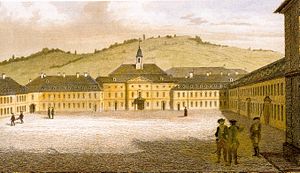Karlsschule Stuttgart
- Machine translation, like DeepL or Google Translate, is a useful starting point for translations, but translators must revise errors as necessary and confirm that the translation is accurate, rather than simply copy-pasting machine-translated text into the English Wikipedia.
- Do not translate text that appears unreliable or low-quality. If possible, verify the text with references provided in the foreign-language article.
- You must provide copyright attribution in the edit summary accompanying your translation by providing an interlanguage link to the source of your translation. A model attribution edit summary is
Content in this edit is translated from the existing German Wikipedia article at [[:de:Hohe Karlsschule]]; see its history for attribution. - You may also add the template
{{Translated|de|Hohe Karlsschule}}to the talk page. - For more guidance, see Wikipedia:Translation.

Hohe Karlsschule (Karl's High School) was the strict military academy founded by Karl Eugen, Duke of Württemberg in Stuttgart, Germany. It was first founded in 1770 as a military orphanage, but then converted into a military academy in 1773 for the duke.[1]
Politically the duke was quite unimportant and with this school he wanted to enhance his prestige. In 1770, it was moved to Castle Solitude, and in 1775 into the city. Raised in 1781 by Emperor Joseph II to university status under the name Karls Hohe Schule, it was disbanded after the death of Duke Carl Eugen by his brother Ludwig Eugen, Duke of Württemberg in 1794. The building, situated behind Neues Schloss, was destroyed in World War II.
Alumni
Friedrich Schiller was one of its alumni.[2] He spent eight years of his life in this academy and suffered a lot in his first years of his stay. At first he was considered an average student, but in his second year, he often became ill and his performance suffered. When he joined the school's medical faculty, his life took a turn for the better and Schiller began with poetry.[1]
Others were Johann Heinrich Dannecker (later professor there), Joseph Anton Koch, Johann Georg Kerner, Johann Heinrich Ferdinand Autenrieth, Philipp Jakob Scheffauer, Johann Rudolf Zumsteeg, Antonio Boroni, Ferdinando Mazzanti, Ludwig Abeille, Johann Gottlieb Sämann, Christian Zais, Adam Albert von Neipperg, Gottlieb Schick, Georges Cuvier, Johann Christoph Friedrich Haug, Nikolaus Friedrich von Thouret, Johann Friedrich LeBret, Karl Wilhelm Marschall von Bieberstein, Ernst Franz Ludwig Marschall von Bieberstein, Friedrich August Marschall von Bieberstein, Friedrich Fürst von Hohenzollern-Hechingen, Carl Friedrich Kielmeyer and Carl Degenkolb.
Notes
- ^ a b Jürgen Schwarz: Schiller kennen lernen. Lichtenau 2004. S. 6-9. "Schiller auf der Karlsschule in Stuttgart (1773-1780)". Archived from the original on 2013-04-26. Retrieved 2013-04-09.
- ^ Barbara Schubert-Felmy, Die Räuber und andere Räubergeschichten, Schöningh, 1999. ISBN 3-506-22284-8. p. 217.
External links
- Karlsschule im Schiller-Film gedreht 1923 von Curt Goetz
- Die Akademiegebäude
- Schiller in der Karlsschule
48°46′40″N 9°11′00″E / 48.77778°N 9.18333°E / 48.77778; 9.18333
- v
- t
- e










